#disability representation
Text
Dealing with Healing and Disability in fantasy: Writing Disability
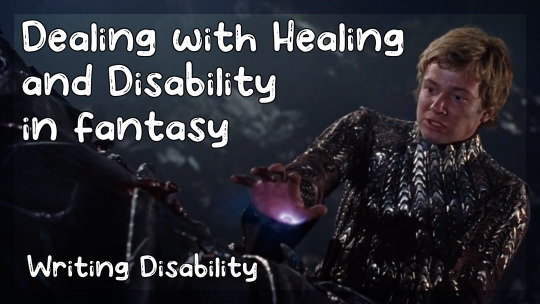
[ID: An image of the main character from Eragon, a white teenage boy with blond hair in silver armour as he sits, with his hand outstretched. On his hand is a glowing blue mark. He is visibly straining as he attempts to heal a large creature in front of him. /End ID]
I'm a massive fan of the fantasy genre, which is why it's so incredibly frustrating when I see so much resistance to adding disability representation to fantasy works. People's go-to reason for leaving us out is usually something to the effect of "But my setting has magic so disability wouldn't exist, it can just be healed!" so let's talk about magic, specifically healing magic, in these settings, and how you can use it without erasing disability from your story.
Ok, let's start with why you would even want to avoid erasing disability from a setting in the first place. I talked about this in a lot more detail in my post on The Miracle Cure. this line of thinking is another version of this trope, but applied to a whole setting (or at least, to the majority of people in the setting) instead of an individual, so it's going to run into the same issues I discussed there. To summarise the points that are relevant to this particular version of the trope though:
Not every disabled person wants or needs a cure - many of us see our disability as a part of our identity. Do difficulties come with being disabled? absolutely! It's literally part of the definition, but for some people in the disabled community, if you took our disabilities away, we would be entirely different people. While it is far from universal, there is a significant number of us who, if given a magical cure with no strings attached, would not take it. Saying no one in your setting would be disabled because these healing spells exists ignores this part of the community.
It messes with the stakes of your story - Just like how resurrecting characters or showing that this is something that is indeed possible in the setting can leave your audience feeling cheated or like they don't have to worry about a character *actually* ever dying. healing a character's disability, or establishing that disability doesn't exist in your setting because "magic" runs into the same problem. It will leave your readers or viewers feeling like they don't have to worry about your characters getting seriously hurt because it will only be temporary, which means your hero's actions carry significantly less risk, which in turn, lowers the stakes and tension if not handled very, very carefully.
It's an over-used trope - quite plainly and simply, this trope shows up a lot in the fantasy genre, to the point where I'd say it's just overused and kind of boring.
So with the "why should you avoid it" covered, let's look at how you can actually handle the topic.
Limited Access and Expensive Costs
One of the most common ways to deal with healing and disability in a fantasy setting, is to make the healing magic available, but inaccessible to most of the population. The most popular way to do that is by making the services of a magical healer capable of curing a disability really expensive to the point that most people just can't afford it. If this is the approach you're going to use, you also typically have to make that type of magic quite rare. To use D&D terms, if every first level sorcerer, bard, cleric and druid can heal a spinal injury, it's going to result in a lot of people who are able to undercut those massive prices and the expense will drop as demand goes down.
If that last sentence didn't give you a hint, this is really popular method in stories that are critiquing capitalistic mindsets and ideologies, and is most commonly used by authors from the USA and other countries with a similar medical system, since it mirrors a lot of the difficulties faced by disabled Americans. If done right, this approach can be very effective, but it does need to be thought through more carefully than I think people tend to do. Mainly because a lot of fantasy stories end with the main character becoming rich and/or powerful, and so these prohibitively expensive cure become attainable by the story's end, which a lot of authors and writer's just never address.
Of course, another approach is to make the availability of the magic itself the barrier. Maybe there just aren't that many people around who know the magic required for that kind of healing, so even without a prohibitive price tag, it's just not something that's an option for most people. If we're looking at a D&D-type setting, maybe you need to be an exceptionally high level to cast the more powerful healing spell, or maybe the spell requires some rare or lost material component. I'd personally advise people to be careful using this approach, since it often leads to stories centred around finding a miracle cure, which then just falls back into that trope more often than not.
Just outright state that some characters don't want/need it
Another, admittedly more direct approach, is to make it that these "cures" exist and are easily attainable, but to just make it that your character or others they encounter don't want or need it. This approach works best for characters who are born with their disabilities or who already had them for a long time before a cure was made available to them. Even within those groups though, this method works better with some types of characters than others depending on many other traits (personality, cultural beliefs, etc), and isn't really a one-size-fits-all solution, but to be fair, that's kind of the point. Some people will want a cure for their disabilities, others are content with their body's the way they are.
There's a few caveats I have with this kind of approach though:
you want to make sure you, as the author, understand why some people in real life don't want a cure, and not just in a "yeah I know these people exist but I don't really get it" kind of way. I'm not saying you have to have a deep, personal understanding or anything, but some degree of understanding is required unless you want to sound like one of those "inspirational" body positivity posts that used to show up on Instagram back in the day.
Be wary when using cultural beliefs as a reasoning. It can work, but when media uses cultural beliefs as a reason for turning down some kind of cure, it's often intending to critique extreme beliefs about medicine, such as the ones seen in some New Age Spirituality groups and particularly intense Christian churches. As a general rule of thumb, it's probably not a good idea to connect these kinds of beliefs to disabled people just being happy in their bodies. Alternatively, you also need to be mindful of the "stuck in time" trope - a trope about indigenous people who are depicted as primitive or, as the name suggests, stuck in an earlier time, for "spurning the ways of the white man" which usually includes medicine or the setting's equivalent magic. I'm not the best person to advise you on how to avoid this specific trope, but my partner (who's Taino) has informed me of how often it shows up in fantasy specifically and we both thought it was worth including a warning at least so creators who are interested in this method know to do some further research.
Give the "cures" long-lasting side effects
Often in the real world, when a "cure" for a disability does exist, it's not a perfect solution and comes with a lot of side effects. For example, if you loose part of your arm in an accident, but you're able to get to a hospital quickly with said severed arm, it can sometimes be reattached, but doing so comes at a cost. Most people I know who had this done had a lot of issues with nerve damage, reduced strength, reduced fine-motor control and often a great deal of pain with no clear source. Two of the people I know who's limbs were saved ended up having them optionally re-amputated only a few years later. Likewise, I know many people who are paraplegics and quadriplegics via spinal injuries, who were able to regain the use of their arms and/or legs. However, the process was not an easy one, and involved years of intense physiotherapy and strength training. For some of them, they need to continue to do this work permanently just to maintain use of the effected limbs, so much so that it impacts their ability to do things like work a full-time job and engage in their hobbies regularly, and even then, none of them will be able bodied again. Even with all that work, they all still experience reduced strength and reduced control of the limbs. depending on the type, place and severity of the injury, some people are able to get back to "almost able bodied" again - such was the case for my childhood best friend's dad, but they often still have to deal with chronic pain from the injury or chronic fatigue.
Even though we are talking about magic in a fantasy setting, we can still look to real-life examples of "cures" to get ideas. Perhaps the magic used has a similar side effect. Yes, your paraplegic character can be "cured" enough to walk again, but the magic maintaining the spell needs a power source to keep it going, so it draws on the person's innate energy within their body, using the very energy the body needs to function and do things like move their limbs. They are cured, but constantly exhausted unless they're very careful, and if the spell is especially strong, the body might struggle to move at all, resulting in something that looks and functions similar to the nerve damage folks with spinal injuries sometimes deal with that causes that muscle weakness and motor control issues. Your amputee might be able to have their leg regrown, but it will always be slightly off. The regrown leg is weaker and causes them to walk with a limp, maybe even requiring them to use a cane or other mobility aid.
Some characters might decide these trade-offs are worth it, and while this cures their initial disability, it leaves them with another. Others might simply decide the initial disability is less trouble than these side effects, and choose to stay as they are.
Consider if these are actually cures
Speaking of looking to the real world for ideas, you might also want to consider whether these cures are doing what the people peddling them are claiming they do. Let's look at the so-called autism cures that spring up every couple of months as an example.
Without getting into the… hotly debated specifics, there are many therapies that are often labelled as "cures" for autism, but in reality, all they are doing is teaching autistic people how to make their autistic traits less noticeable to others. This is called masking, and it's a skill that often comes at great cost to an autistic person's mental health, especially when it's a behaviour that is forced on them. Many of these therapies give the appearance of being a cure, but the disability is still there, as are the needs and difficulties that come with it, they're just hidden away. From an outside perspective though, it often does look like a success, at least in the short-term.
Then there are the entirely fake cures with no basis in reality, the things you'll find from your classic snake-oil salesmen. Even in a fantasy setting where real magic exists, these kinds of scams and misleading treatments can still exist. In fact, I think it would make them even more common than they are in the real world, since there's less suspension of disbelief required for people to fall for them. "What do you mean this miracle tonic is a scam? Phil next door can conjure flames in his hand and make the plants grow with a snap of his fingers, why is it so hard to believe this tonic could regrow my missing limb?"
I think the only example of this approach I've seen, at least recently, is from The Owl House. The magic in this world can do incredible things, but it works in very specific and defined ways. Eda's curse (which can be viewed as an allegory for many disabilities and chronic illnesses) is seemingly an exception to this, and as such, nothing is able to cure it. Treat it, yes, but not cure it. Eda's mother doesn't accept this though, and seeks out a cure anyway and ends up falling for a scam who's "treatments" just make things worse.
In your own stories, you can either have these scams just not work, or kind of work, but in ways that are harmful and just not worth it, like worse versions of the examples in the previous point. Alternatively, like Eda, it's entirely reasonable that a character who's been the target of these scams before might just not want to bother anymore. Eda is a really good example of this approach handled in a way that doesn't make her sad and depressed about it either. She's tried her mum's methods, they didn't work, and now she's found her own way of dealing with it that she's happy with. She only gets upset when her boundaries are ignored by Luz and her mother.
Think about how the healing magic is actually working
If you have a magic system that leans more on the "hard magic" side of things, a great way to get around the issue of healing magic erasing disability is to stop and think about how your healing magic actually works.
My favourite way of doing this is to make healing magic work by accelerating the natural processes of your body. Your body will, given enough time (assuming it remains infection-free) close a slash from a sword and mend a broken bone, but it will never regrow it's own limbs. It will never heal damage to it's own spinal cord. It will never undo whatever causes autism or fix it's own irregularities. Not without help. Likewise, healing magic alone won't do any of these things either, it's just accelerating the existing process and usually, by extension making it safer, since a wound staying open for an hour before you get to a healer is much less likely to get infected than one that slowly and naturally heals over a few weeks.
In one of my own works, I take this even further by making it that the healing magic is only accelerating cell growth and repair, but the healer has to direct it. In order to actually heal, the healer needs to know the anatomy of what they're fixing to the finest detail. A spell can reconnect a torn muscle to a bone, but if you don't understand the structures that allow that to happen in the first place, you're likely going to make things worse. For this reason, you won't really see people using this kind of magic to, say, regrow limbs, even though it technically is possible. A limb is a complicated thing. The healer needs to be able to perfectly envision all the bones, the cartilage, the tendons and ligaments, the muscles (including the little ones, like those found in your skin that make your hair stand on end and give you goose bumps), the fat and skin tissues, all the nerves, all the blood vessels, all the structures within the bone that create your blood. Everything, and they need to know how it all connects, how it is supposed to move and be able to keep that clearly in their mind simultaneously while casting. Their mental image also has to match with the patient's internal "map" of the body and the lost limb, or they'll continue to experience phantom limb sensation even if the healing is successful. It's technically possible, but the chances they'll mess something up is too high, and so it's just not worth the risk to most people, including my main character.
Put Restrictions on the magic
This is mostly just the same advice as above, but for softer magic systems. put limits and restrictions on your healing magic. These can be innate (so things the magic itself is just incapable of doing) or external (things like laws that put limitations on certain types of magic and spells).
An example of internal restriction can be seen in how some people interpret D&D's higher level healing spells like regenerate (a 7th level spell-something most characters won't have access to for quite some time). The rules as written specify that disabilities like lost limbs can be healed using this spell, but some players take this to mean that if a character was born with the disability in question, say, born without a limb, regenerate would only heal them back to their body's natural state, which for them, is still disabled.
An external restriction would be that your setting has outlawed healing magic, perhaps because healing magic carries a lot of risks for some reason, eithe to the caster or the person being healed, or maybe because the healing magic here works by selectively reviving and altering the function of cells, which makes it a form of necromancy, just on a smaller scale. Of course, you can also use the tried and true, "all magic is outlawed" approach too. In either case, it's something that will prevent some people from being able to access it, despite it being technically possible. Other external restrictions could look like not being illegal, per say, but culturally frowned upon or taboo where your character is from.
But what if I don't want to do any of this?
Well you don't have to. These are just suggestions to get you thinking about how to make a world where healing magic and disability exist, but they aren't the only ways. Just the ones I thought of.
Of course, if you'd still rather make a setting where all disability is cured because magic and you just don't want to think about it any deeper, I can't stop you. I do however, want to ask you to at least consider where you are going to draw the line.
Disability, in essence, is what happens when the body stops (or never started) functioning "normally". Sometimes that happens because of an injury, sometimes it's just bad luck, but the boundary between disabled and not disabled is not as solid as I think a lot of people expect it to be, and we as a society have a lot of weird ideas about what is and isn't a disability that just, quite plainly and simply, aren't consistent. You have to remember, a magic system won't pick and choose the way we humans do, it will apply universally, regardless of our societal hang-ups about disability.
What do I mean about this?
Well, consider for a moment, what causes aging?
it's the result of our body not being able to repair itself as effectively as it used to. It's the body not being able to perform that function "normally". So in a setting where all disability is cured, there would be no aging. No elderly people. No death from old age. If you erase disability, you also erase natural processes like aging. magic won't pick and choose like that, not if you want it to be consistent.
Ok, ok, maybe that's too much of a stretch, so instead, let's look at our stereotypical buff hero covered in scars because he's a badass warrior. but in a world where you can heal anything, why would anything scar? Even if it did, could another healing spell not correct that too? Scars are part of the body's natural healing process, but if no natural healing occurred, why would a scar form? Scars are also considered disabling in and of themselves too, especially large ones, since they aren't as flexible or durable as normal skin and can even restrict growth and movement.
Even common things like needing glasses are, using this definition of disability at least, a disability. glasses are a socially accepted disability aid used to correct your eyes when they do not function "normally".
Now to be fair, in reality, there are several definitions of disability, most of which include something about the impact of society. For example, in Australia (according to the Disability Royal Commission), we define disability as "An evolving concept that results from the interaction between a person with impairment(s) and attitudinal and environmental barriers that hinder their full and effective participation in society on an equal basis with others." - or in laymen's terms, the interaction between a person's impairment and societal barriers like people not making things accessible or holding misinformed beliefs about your impairment (e.g. people in wheelchairs are weaker than people who walk). Under a definition like this, things like scars and needing glasses aren't necessarily disabilities (most of the time) but that's because of how our modern society sees them. The problem with using a definition like this though to guide what your magic system will get rid of, is that something like a magic system won't differentiate between an "impairment" that has social impacts that and one that doesn't. It will still probably get rid of anything that is technically an example of your body functioning imperfectly, which all three of these things are. The society in your setting might apply these criteria indirectly, but really, why would they? Very few people like the side effects of aging on the body (and most people typically don't want to die), the issues that come with scars or glasses are annoying (speaking as someone with both) and I can see a lot of people getting rid of them when possible too. If they don't then it's just using the "not everyone wants it approach" I mentioned earlier. If there's some law or some kind of external pressure to push people away from fixing these more normalised issues, then it's using the "restrictions" method I mentioned earlier too.
Once again, you can do whatever you like with your fantasy setting, but it's something I think that would be worth thinking about at least.
#Writing disability with Cy Cyborg#Long Post#Disability#Disabled#Disability Representation#Writing Disability#Writing#Writeblr#Authors#Creators#Writing Advice#Disabled Characters#On Writing#Disability in Media#Tropes#Disability Tropes#magic#fantasy#worldbuilding#magic systems
108 notes
·
View notes
Text
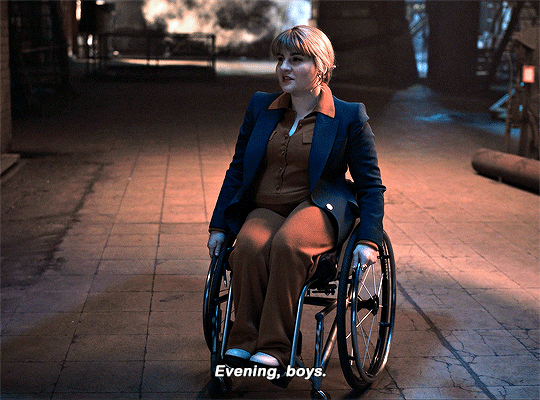
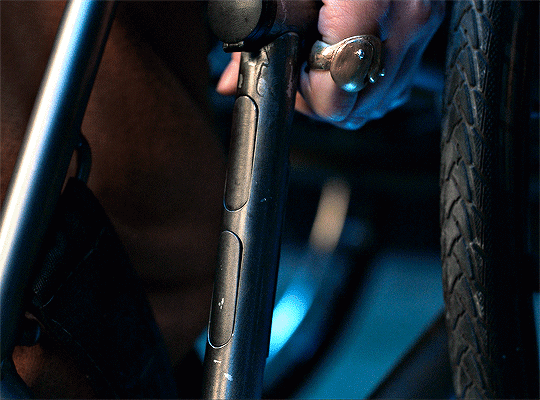

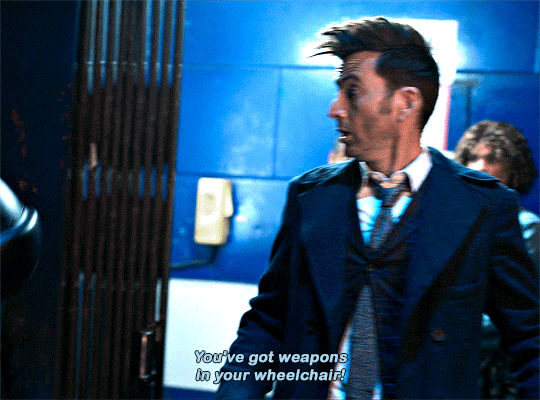
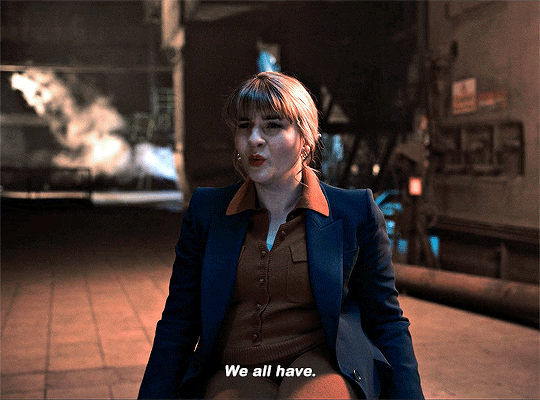
# so here for badass disabled character representation
#*mine#dwedit#timelordgifs#dw#doctor who#dw spoilers#shirley anne bingham#fourteenth doctor#userbbelcher#userstream#useroptional#david tennant#ruth madeley#disability#disability representation#she already means everything to me
13K notes
·
View notes
Text
“alt text for more info” “turn on cations for more info” no actually this is not where more info goes. These have a very distinct purpose. There are plenty of other places for more info. If you’re going to make your post inaccessible, the least you could do is not use accessibility tools at your own leisure for whatever purpose you see fit.
#disability accessibility#accessibility#vision impaired#hearing impaired#hard of hearing#physical disability#sensory disability#disability accommodations#disability representation#disability advocacy#equitability#neurodiversity#adhd autistic#disabled things#alt text#captioning#subtitles#disability resources#accessibility tools
4K notes
·
View notes
Text
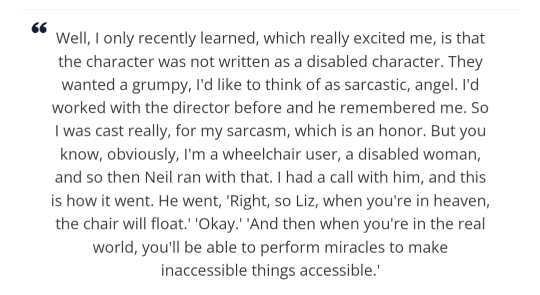
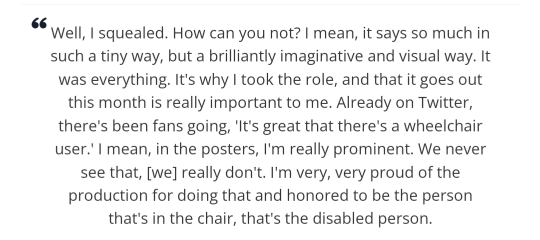
I know we all love to talk about the amazing queer representation in Good Omens, but can we also talk about that DISABILITY REP?
From this interview with Liz Carr who plays Saraquel.
#good omens#good omens season 2#liz carr#disability#disability rights#disability representation#accessibility#neil gaiman
5K notes
·
View notes
Text
We need better queer representation in shows movies and books
We need queer POC
We need people who don't want to label their gender or sexuality
We need trans people who's transition goals aren't to look cis
We need queer people with diverse religions
We need queer people who use pronouns that don't "match" their gender
We need aromantic and asexual characters
We need disabled queer people
We need queer people who use multiple labels for themselves
We need queer people who's entire personality isn't being queer
We need queer people who aren't just there because of romance
We need real and diverse queer people in the media
#lgbtq#lgbt#pride#queer#lgbt pride#bisexuality#lesbian#gay#gay pride#pansexual#omnisexual#trans#transgender#nonbinary#genderfluid#aromantic#asexual#aroace#agender#bigender#genderqueer#gender nonconforming#xenogender#queer poc#enby#representation matters#queer representation#disability representation#disabled queer
1K notes
·
View notes
Text
I wish there was more representation of disabilities and chronic illness in fantasy, science fiction and action genres.
Not just a side character with 30 seconds of screentime. An important character that doesn't just exist to further the storylines of other characters. I want a character that doesn't get "cured" or healed. A character that stays disabled and/or chronically ill. A character that isn't afraid to ask for help. One that doesn't think they're a burden and doesn't try to hide their disability/ chronic illness.
I want to see how it affects them, not just know they're disabled/chronically ill and it jist never gets mentioned again. I don't mean it should be their entire personality but being disabled and or chronically ill can affect many parts of life.
I just wish there was more representation of disabilities and chronic illness that shows every part of it. Especially in fantasy and science fiction it's lacking.
#disabled#disability#chronic illness#chronically ill#tumblr#cripple punk#fantasy#science fiction#action#representation#disability representation#chronic illness representation
3K notes
·
View notes
Text
im kinda tired of the assumption that physical disability = visible, and non-physical disability = invisible. it is not that simple and it certainly aint the case for me.
#disability#disabled#actually disabled#disabilties#autism#physical disability#actually autistic#physically disabled#invisible disability#visible disability#disability representation#disabilities
1K notes
·
View notes
Text
Petition to add more disabled magical creatures in fantasy
Like picture a mermaid. When they have to be on land their tail turns to legs, but because their body is used to lower gravity their joints tire easily and are chronically in pain.
Also depending on how deep in the ocean they live, it’s likely they have circulation problems because their body is used to the water pressure holding everything where it needs to be and now their blood is always fucking pooling in their legs and they have to wear compression socks everywhere.
Wheelchair user mermaids. Partially/fully blind mermaids because who needs to see when there’s no light at the bottom of the ocean?
Mermaids with sensory issues who have to wear headphones all the time because sound is so much louder up here on land and they are constantly overstimulated. And also the sun is simply Too Bright™.
Mermaids who have POTS because in the water postural changes make no difference and their bodies don’t know how to stabilize with so much gravity.
I’m really fixated on the mermaids rn but PLEASE feel more than welcome to add more!!!! I wanna hear about disabled dragons
#fantasy#high fantasy#disability#mermaids#disability representation#books and reading#fantasy books#dragons#potsie#chronic pain#chronic fatigue#wheelchair users
2K notes
·
View notes
Text
Actually, this deserves its own post because the way Abbott Elementary handled Melissa's character in this episode is genuinely some of the best dyslexia representation I have ever seen on TV.
She's not a little kid who overcomes her disability as an adult. Her dyslexia doesn't give her superpowers (weirdly common trope). She isn't portrayed as stupid by the show or the other characters because of it. She's a competent adult who has developed coping mechanisms to deal with her disability and is still shown to struggle sometimes despite that! Oh my god is that refreshing!
Also, Melissa being competitive about the reading challenge and Barbra's comment about how good she is at engaging kids in reading is totally recontextualized by the reveal that she has a learning disability and especially the reveal that she was probably teased for her LD as a kid (which I'm also so happy that they brought up - I don't think most people realize how competitive elementary schools tend to make reading, and how shitty and ostracizing that can be for kids who struggle with it). Winning the book challenge is important to her because it's something she used to really struggle with. She's good at getting kids to read because she can relate to their challenges in a personal way. They directly tie her LD to her strengths as a teacher without it being fantastical or over-emphasized and I can't even begin to tell you how much I love it!
The bit at the end where she says "you know how sometimes I have to read things a few times" to Janine, in the break room with no students present is also a great scene because it shows her LD in an adult, professional context. It's a conversation that I, and every dyslexic person I know, has had with their co-workers at some point. I just love that they make a point of normalizing her LD in an adult workplace setting that's separate from the classroom and away from the kids.
This season has done an awesome job talking about disability generally but the choice to give not just a student, but one of the teachers an LD was an absolutely perfect move. I really hope this gets brought up in later episodes and isn't just a one-off.
#abbott elementary#melissa schemmenti#dyslexia#disability representation#Quinta must have taken the time to higher and work with a sensitivity reader for this episode and bless her for it#I truly expect so little from dyslexia rep at this point#it was amazing to see it handled so well here
5K notes
·
View notes
Text
Write more characters with physical disabilities. Write more characters with mental disabilities. Write characters with neurodivergence (more than one specific type too). Write characters with mobility aids. Write characters who have good and bad health days. Write characters who are chronically in pain, but don't express it every second. Write characters who were born with a disability. Write characters who developed one. Write characters who have adapted to the world around them because the world won't adapt for them. Write about their strengths and weaknesses due to their disability. Write about accessibility. Write about inaccessibility. Make it realistic.
Don't make the disability magically disappear or be cured (or at least be mindful of how you write that). Don't make it their entire personality but also don't skip over it. Don't use stereotypes (and that's not just with disabilities). Don't make the character actively hate their disability; they're allowed to be upset but most people with disabilities have learned to accept it as part of their life and accept it as part of their identity.
#writeblr#writers on tumblr#writing advice#writing community#creative writing#if you don't know how research it#that's a huge part of writing#media representation#accessibility#disability representation#neurodiversity#disabled characters#writing disabilities#writing disabled characters
1K notes
·
View notes
Text
Writing and drawing amputee characters: Not every amputee wears prosthetics (and that's ok)
Not every amputee wears prosthetics, and not doing so is not a sign that they've "given up".
It's a bit of a trope that I've noticed that when an amputee, leg amputees in particular, don't wear prosthetics in media its often used as a sign that they've given up hope/stopped trying/ are depressed etc. If/when they start feeling better, they'll start wearing their prosthetics again, usually accompanied by triumphant or inspiring music (if it's a movie). The most famous example of this is in Forest Gump, Where Dan spends most of the movie after loosing his legs wishing he'd died instead. He does eventually come around, and him finally moving from his wheelchair to prosthetics is meant to highlight this.
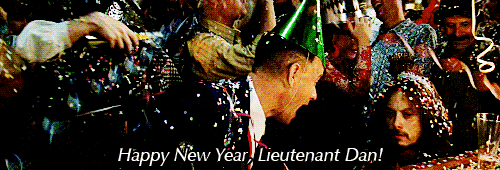
The thing is, it's not that it's unrealistic - in fact my last major mental health spiral was started because one of my prosthetics was being a shit and wouldn't go on properly, despite fitting perfectly at the prosthetist's the day before. I'm not going to use my legs when I'm not in a good headspace, but the problem is, this is the only time non-prosthetic using amputees ever get representation: to show how sad they are. Even if that's not what the creator/writer necessarily intended, audiences will often make that assumption on their own unless you're very careful and intentional about how you frame it, because it's what existing media has taught them to expect.
But there are lots of reasons why someone might not use prosthetics:
they might not need them: this is more common in arm amputees because of how difficult it can be to use arm prosthetic, especially above-elbow prosthetics. Most folks learn how to get on without them pretty well. In fact, most of the arm amputees I know don't have prosthetics, or only have them for specific tasks (e.g. I knew a girl who had a prosthetic hand made specifically for rowing, but that's all she used it for).
Other mobility aids just work better for them: for me, I'm faster, more manoeuvrable and can be out for longer when I'm in my wheelchair than I ever could on my prosthetics. Youtube/tik tok creator Josh Sundquist has said the same thing about his crutches, he just feels better using them than his prosthetic. This isn't the case for everyone of course, but it is for some of us. Especially people with above-knee prosthetics, in my experience.
Other disabilities make them harder to use: Some people are unable to use prosthetics due to other disabilities, or even other amputations. Yeah, as it turns out, a lot of prosthetics are only really designed for single-limb amputees. While they're usable for multi-limb amps, they're much harder to use or they might not be able to access every feature. For example, the prosthetic knee I have has the ability to monitor the walk cycle of the other leg and match it as close as possible - but that only works if you have a full leg on the other side. Likewise, my nan didn't like using her prosthetic, as she had limited movement in her shoulders that meant she physically couldn't move her arms in the right way to get her leg on without help.
Prosthetics are expensive in some parts of the world: not everyone can afford a prosthetic. My left prosthetic costs around $5,000 Australian dollars, but my right one (the above knee) cost $125,000AUD. It's the most expensive thing I own that I only got because my country pays for medical equipment for disabled folks. Some places subsidise the cost, but paying 10% of $125,000 is still $12,500. Then in some places, if you don't have insurance, you have to pay for that all by yourself. Even with insurance you still have to pay some of it depending on your cover. Arm prosthetics are even more expensive. Sure, both arms and legs do have cheaper options available, but they're often extremely difficult to use. You get what you pay for.
they aren't suitable for every type of environment: Prosthetics can be finicky and modern ones can be kind of sensitive to the elements. My home town was in a coastal lowland - this means lots of beaches and lots of swamp filled with salty/brackish water. The metals used in prosthetics don't hold up well in those conditions, and so they would rust quicker, I needed to clean them more, I needed to empty sand out of my foot ALL THE TIME (there always seemed to be more. It was like a bag of holding but it was just sand). Some prosthetics can't get wet at all. There were a few amputees who moved to the area when I was older who just didn't bother lol. It wasn't worth the extra effort needed for the maintenance.
People have allergies to the prosthetic material: This is less of a problem in the modern day, but some people are allergic to the materials their prosthetics are made from. You can usually find an alternative but depending on the type of allergy, some people are allergic to the replacements too.
Some people just don't like them.
There's nothing wrong with choosing to go without a prosthetic. There's nothing wrong with deciding they aren't for you. It doesn't make you a failure or sad or anything else. Using or not using prosthetics is a completely morally neutral thing.
Please, if you're writing amputees, consider if a prosthetic really is the best mobility aid for your character and consider having your characters go without, or at least mix it up a bit.
For example, Xari, one of the main characters in my comic, uses prosthetics unsupported and with crutches, and uses a wheelchair. They alternate between them throughout the story.
#disability#disabled#id in alt text#writing#writing disability#disability representation#authors of tumblr#write#writeblr#writers on tumblr#writerscommunity#writer#creative writing#writing tips#writing resources#writing help#writing advice#writing disability with cy cyborg
2K notes
·
View notes
Text
Can I just take a moment to give a big shoutout to Neil, Pterry and the team for REPRESENTATION!
It’s so natural in the show that we almost take it for granted. But in this world, we see characters of every race, every gender, every sex, every sexuality, every ability as if it’s the most normal thing in the world. Women have agency. Sex workers are treated with respect. Hooligans use Grindr. Middle-aged+ people are sexy. No-one ever jeers or laughs or demeans someone for what they ARE, just how they’re behaving.
And with a couple of exceptions, these characters aren’t the Hollywood ideal of beauty, but they ARE all beautiful in their own unique ways. Even demons and zombies with rotting faces and mouths full of flies. Everyone just shines from inside out.
#good omens#go2#neil gaiman#terry pratchett#lgbt representation#queer representation#black representation#disability representation#feminist#trans representation#representation matters
1K notes
·
View notes
Text
Gentle reminder that your disability and/or chronic illness struggles are valid, even if others have it worse. It’s not like there’s one definitive Most Disabled Person In The World and they’re the only one entitled to accommodations or reactive emotions. That’s not how it works <3
#physical disability#chronic illness#neurological disability#adhd autistic#audhd#neurodiversity#did osdd#late diagnosed autistic#complex trauma#invisible disability#invisible illness#intersectionality#comorbidities#comorbid conditions#disability representation#disability accommodations#disability advocacy#chronic pain#chronic fatigue#chronically ill#disabled representation#disabled rant#disability things#chronic illness things
2K notes
·
View notes
Text
The Disability Library
I love books, I love literature, and I love this blog, but it's only been recently that I've really been given the option to explore disabled literature, and I hate that. When I was a kid, all I wanted was to be able to read about characters like me, and now as an adult, all I want is to be able to read a book that takes us seriously.
And so, friends, Romans, countrymen, I present, a special disability and chronic illness booklist, compiled by myself and through the contributions of wonderful members from this site!
As always, if there are any at all that you want me to add, please just say. I'm always looking for more!
Edit 20/10/2023: You can now suggest books using the google form at the bottom!
Updated: 31/08/2023
Articles and Chapters
The Drifting Language of Architectural Accessibility in Victor Hugo's Notre-Dame de Paris, Essaka Joshua, 2012
Early Modern Literature and Disability Studies, Allison P. Hobgood, David Houston Wood, 2017
How Do You Develop Whole Object Relations as an Adult?, Elinor Greenburg, 2019
Making Do with What You Don't Have: Disabled Black Motherhood in Octavia E. Butler's Parable of the Sower and Parable of the Talents, Anna Hinton, 2018
Necropolitics, Achille Mbeme, 2003 OR Necropolitics, Achille Mbeme, 2019
Wasted Lives: Modernity and Its Outcasts, Zygmunt Bauman, 2004
Witchcraft and deformity in early modern English Literature, Scott Eaton, 2020
Books
Fiction:
Misc:
10 Things I Can See From Here, Carrie Mac
A-F:
A Curse So Dark and Lonely, (Series), Brigid Kemmerer
Akata Witch, (Series), Nnedi Okorafor
A Mango-Shaped Space, Wendy Mass
Ancillary Justice, (Series), Ann Leckie
An Unkindness of Ghosts, Rivers Solomon
An Unseen Attraction, (Series), K. J. Charles
A Shot in the Dark, Victoria Lee
A Snicker of Magic, Natalie Lloyd
A Song of Ice and Fire, (series), George R. R. Martin
A Spindle Splintered, (Series), Alix E. Harrow
A Time to Dance, Padma Venkatraman
Bath Haus, P. J. Vernon
Beasts of Prey, (Series), Ayana Gray
The Bedlam Stacks, (Series), Natasha Pulley
Black Bird, Blue Road, Sofiya Pasternack
Black Sun, (Series), Rebecca Roanhorse
Blood Price, (Series), Tanya Huff
Borderline, (Series), Mishell Baker
Breath, Donna Jo Napoli
The Broken Kingdoms, (Series), N.K. Jemisin
Brute, Kim Fielding
Cafe con Lychee, Emery Lee
Carry the Ocean, (Series), Heidi Cullinan
Challenger Deep, Neal Shusterman
Cinder, (Series), Marissa Meyer
Clean, Amy Reed
Connection Error, (Series), Annabeth Albert
Cosima Unfortunate Steals A Star, Laura Noakes
Crazy, Benjamin Lebert
Crooked Kingdom, (Series), Leigh Bardugo
Daniel Cabot Puts Down Roots, (Series), Cat Sebastian
Daniel, Deconstructed, James Ramos
Dead in the Garden, (Series), Dahlia Donovan
Dear Fang, With Love, Rufi Thorpe
Deathless Divide, (Series), Justina Ireland
The Degenerates, J. Albert Mann
The Doctor's Discretion, E.E. Ottoman
Earth Girl, (Series), Janet Edwards
Everyone in This Room Will Someday Be Dead, Emily R. Austin
The Extraordinaries, (Series), T. J. Klune
The Extraordinary Education of Nicholas Benedict, (Series), Trenton Lee Stewart
Fight + Flight, Jules Machias
The Final Girl Support Group, Grady Hendrix
Finding My Voice, (Series), Aoife Dooley
The First Thing About You, Chaz Hayden
Follow My Leader, James B. Garfield
Forever Is Now, Mariama J. Lockington
Fortune Favours the Dead, (Series), Stephen Spotswood
Fresh, Margot Wood
H-0:
Harmony, London Price
Harrow the Ninth, (series), Tamsyn Muir
Hench, (Series), Natalia Zina Walschots
Highly Illogical Behaviour, John Corey Whaley
Honey Girl, Morgan Rogers
How to Become a Planet, Nicole Melleby
How to Bite Your Neighbor and Win a Wager, (Series), D. N. Bryn
How to Sell Your Blood & Fall in Love, (Series), D. N. Bryn
Hunger Pangs: True Love Bites, Joy Demorra
I Am Not Alone, Francisco X. Stork
The Immeasurable Depth of You, Maria Ingrande Mora
In the Ring, Sierra Isley
Into The Drowning Deep, (Series), Mira Grant
Iron Widow, (Series), Xiran Jay Zhao
Izzy at the End of the World, K. A. Reynolds
Jodie's Journey, Colin Thiele
Just by Looking at Him, Ryan O'Connell
Kissing Doorknobs, Terry Spencer Hesser
Lakelore, Anna-Marie McLemore
Learning Curves, (Series), Ceillie Simkiss
Let's Call It a Doomsday, Katie Henry
The Library of the Dead, (Series), TL Huchu
The Lion Hunter, (Series), Elizabeth Wein
Lirael, (Series), Garth Nix
Long Macchiatos and Monsters, Alison Evans
Love from A to Z, (Series), S.K. Ali
Lycanthropy and Other Chronic Illnesses, Kristen O'Neal
Never Let Me Go, Kazuo Ishiguro
The Never Tilting World, (Series), Rin Chupeco
The No-Girlfriend Rule, Christen Randall
Nona the Ninth, (series), Tamsyn Muir
Noor, Nnedi Okorafor
Odder Still, (Series), D. N. Bryn
Once Stolen, (Series), D. N. Bryn
One For All, Lillie Lainoff
On the Edge of Gone, Corinne Duyvis
Origami Striptease, Peggy Munson
Our Bloody Pearl, (Series), D. N. Bryn
Out of My Mind, Sharon M. Draper
P-T:
Parable of the Sower, (Series), Octavia E. Butler
Parable of the Talents, (Series), Octavia E. Butler
Percy Jackson & the Olympians, (series), Rick Riordan
Pomegranate, Helen Elaine Lee
The Prey of Gods, Nicky Drayden
The Pursuit Of..., (Series), Courtney Milan
The Queen's Thief, (Series), Megan Whalen Turner
The Quiet and the Loud, Helena Fox
The Raging Quiet, Sheryl Jordan
The Reanimator's Heart, (Series), Kara Jorgensen
The Remaking of Corbin Wale, Joan Parrish
Roll with It, (Series), Jamie Sumner
Russian Doll, (Series), Cristelle Comby
The Second Mango, (Series), Shira Glassman
Scar of the Bamboo Leaf, Sieni A.M
Shaman, (Series), Noah Gordon
Sick Kids in Love, Hannah Moskowitz
The Silent Boy, Lois Lowry
Six of Crows, (Series) Leigh Bardugo
Sizzle Reel, Carlyn Greenwald
The Spare Man, Mary Robinette Kowal
The Stagsblood Prince, (Series), Gideon E. Wood
Stake Sauce, Arc 1: The Secret Ingredient is Love. No, Really, (Series), RoAnna Sylver
Stars in Your Eyes, Kacen Callender [Expected release: Oct 2023]
The Storm Runner, (Series), J. C. Cervantes
Stronger Still, (Series), D. N. Bryn
Sweetblood, Pete Hautman
Tarnished Are the Stars, Rosiee Thor
The Theft of Sunlight, (Series), Intisar Khanani
Throwaway Girls, Andrea Contos
Top Ten, Katie Cotugno
Torch, Lyn Miller-Lachmann
Treasure, Rebekah Weatherspoon
Turtles All the Way Down, John Green
U-Z:
Unlicensed Delivery, Will Soulsby-McCreath
Expected release October 2023
Verona Comics, Jennifer Dugan
Vorkosigan Saga, (Series), Lois McMaster Bujold
We Are the Ants, (Series), Shaun David Hutchinson
The Weight of Our Sky, Hanna Alkaf
Whip, Stir and Serve, Caitlyn Frost and Henry Drake
The Whispering Dark, Kelly Andrew
Wicked Sweet, Chelsea M. Cameron
Wonder, (Series), R. J. Palacio
Wrong to Need You, (Series), Alisha Rai
Ziggy, Stardust and Me, James Brandon
Graphic Novels:
A Quick & Easy Guide to Sex & Disability, (Non-Fiction), A. Andrews
Constellations, Kate Glasheen
Dancing After TEN: a graphic memoir, (memoir) (Non-Fiction), Vivian Chong, Georgia Webber
Everything Is an Emergency: An OCD Story in Words Pictures, (memoir) (Non-Fiction), Jason Adam Katzenstein
Frankie's World: A Graphic Novel, (Series), Aoife Dooley
The Golden Hour, Niki Smith
Nimona, N. D. Stevenson
The Third Person, (memoir) (Non-Fiction), Emma Grove
Magazines and Anthologies:
Artificial Divide, (Anthology), Robert Kingett, Randy Lacey
Beneath Ceaseless Skies #175: Grandmother-nai-Leylit's Cloth of Winds, (Article), R. B. Lemburg
Defying Doomsday, (Anthology), edited by Tsana Dolichva and Holly Kench
Josee, the Tiger and the Fish, (short story) (anthology), Seiko Tanabe
Nothing Without Us, edited by Cait Gordon and Talia C. Johnson
Nothing Without Us Too, edited by Cait Gordon and Talia C. Johnson
Unbroken: 13 Stories Starring Disabled Teens, (Anthology), edited by Marieke Nijkamp
Uncanny #24: Disabled People Destroy Science Fiction, (Anthology), edited by: Elsa Sjunneson-Henry, Dominik Parisien et al.
Uncanny #30: Disabled People Destroy Fantasy, (Anthology), edited by: Nicolette Barischoff, Lisa M. Bradley, Katharine Duckett
We Shall Be Monsters, edited by Derek Newman-Stille
Manga:
Perfect World, (Series), Rie Aruga
The Sky is Blue with a Single Cloud, (Short Stories), Kuniko Tsurita
Non-Fiction:
Academic Ableism: Disability and Higher Education, Jay Timothy Dolmage
A Disability History of the United States, Kim E, Nielsen
The Architecture of Disability: Buildings, Cities, and Landscapes beyond Access, David Gissen
Being Seen: One Deafblind Woman's Fight to End Ableism, Elsa Sjunneson
Black Disability Politics, Sami Schalk
Borderline, Narcissistic, and Schizoid Adaptations: The Pursuit of Love, Admiration, and Safety, Dr. Elinor Greenburg
Brilliant Imperfection: Grappling with Cure, Eli Clare
The Cambridge Companion to Literature and Disability, Barker, Clare and Stuart Murray, editors.
The Capacity Contract: Intellectual Disability and the Question of Citizenship, Stacy Clifford Simplican
Capitalism and Disability, Martha Russel
Care work: Dreaming Disability Justice, Leah Lakshmi Piepzna-Samarasinha
Catatonia, Shutdown and Breakdown in Autism: A Psycho-Ecological Approach, Dr Amitta Shah
The Collected Schizophrenias: Essays, Esme Weijun Wang
Crip Kinship, Shayda Kafai
Crip Up the Kitchen: Tools, Tips and Recipes for the Disabled Cook, Jules Sherred
Culture – Theory – Disability: Encounters between Disability Studies and Cultural Studies, Anne Waldschmidt, Hanjo Berressem, Moritz Ingwersen
Decarcerating Disability: Deinstitutionalization and Prison Abolition, Liat Ben-Moshe
Demystifying Disability: What to Know, What to Say, and How to Be an Ally, Emily Ladau
Dirty River: A Queer Femme of Color Dreaming Her Way Home, Leah Lakshmi Piepzna-Samarasinha
Disability Pride: Dispatches from a Post-ADA World, Ben Mattlin
Disability Visibility: First-Person Stories From the Twenty-First Century, Alice Wong
Disfigured: On Fairy Tales, Disability and Making Space, Amanda Leduc
Every Cripple a Superhero, Christoph Keller
Exile and Pride: Disability, Queerness and Liberation, Eli Clare
Feminist Queer Crip, Alison Kafer
The Future Is Disabled: Prophecies, Love Notes, and Mourning Songs, Leah Lakshmi Piepzna-Samarasinha
Growing Up Disabled in Australia, Carly Findlay
It's Just Nerves: Notes on a Disability, Kelly Davio
The Immortal Life of Henrietta Lacks, Rebecca Skloot
Language Deprivation & Deaf Mental Health, Neil S. Glickman, Wyatte C. Hall
The Minority Body: A Theory of Disability, Elizabeth Barnes
My Body and Other Crumbling Empires: Lessons for Healing in a World That Is Sick, Lyndsey Medford
No Right to Be Idle: The Invention of Disability, 1840s-1930s, Sarah F. Rose
Nothing About Us Without Us: Disability Oppression and Empowerment, James I. Charlton
The Pedagogy of Pathologization Dis/abled Girls of Color in the School-prison Nexus, Subini Ancy Annamma
Physical Disability in British Romantic Literature, Essaka Joshua
QDA: A Queer Disability Anthology, Raymond Luczak, Editor.
The Right to Maim: Debility, Capacity, Disability, Jasbir K. Puar
Sitting Pretty, (memoir), Rebecca Taussig
Sounds Like Home: Growing Up Black & Deaf in the South, Mary Herring Wright
Surviving and Thriving with an Invisible Chronic Illness: How to Stay Sane and Live One Step Ahead of Your Symptoms, Ilana Jacqueline
The Things We Don't Say: An Anthology of Chronic Illness Truths, Julie Morgenlender
Uncanny Bodies: Superhero Comics and Disability, Scott T. Smith, José Alaniz
Uncomfortable Labels: My Life as a Gay Autistic Trans Woman, (memoir), Laura Kate Dale
Unmasking Autism, Devon Price
The War on Disabled People: Capitalism, Welfare and the Making of a Human Catastrophe, Ellen Clifford
We've Got This: Essays by Disabled Parents, Eliza Hull
Year of the Tiger: An Activist's Life, (memoir) (essays) Alice Wong
Picture Books:
A Day With No Words, Tiffany Hammond, Kate Cosgrove-
A Friend for Henry, Jenn Bailey, Mika Song
Ali and the Sea Stars, Ali Stroker, Gillian Reid
All Are Welcome, Alexandra Penfold, Suzanne Kaufman
All the Way to the Top, Annette Bay Pimentel, Jennifer Keelan-Chaffins, Nabi Ali
Can Bears Ski?, Raymond Antrobus, Polly Dunbar
Different -- A Great Thing to Be!, Heather Alvis, Sarah Mensinga
Everyone Belongs, Heather Alvis, Sarah Mensinga
I Talk Like a River, Jordan Scott, Sydney Smith
Jubilee: The First Therapy Horse and an Olympic Dream, K. T. Johnson, Anabella Ortiz
Just Ask!, Sonia Sotomayor, Rafael López
Kami and the Yaks, Andrea Stenn Stryer, Bert Dodson
My Three Best Friends and Me, Zulay, Cari Best, Vanessa Brantley-Newton
Rescue & Jessica: A Life-Changing Friendship, Jessica Kensky, Patrick Downes, Scott Magoon
Sam's Super Seats, Keah Brown, Sharee Miller
Small Knight and the Anxiety Monster, Manka Kasha
We Move Together, Kelly Fritsch, Anne McGuire, Eduardo Trejos
We're Different, We're the Same, and We're All Wonderful!, Bobbi Jane Kates, Joe Mathieu
What Happened to You?, James Catchpole, Karen George
The World Needs More Purple People, Kristen Bell, Benjamin Hart, Daniel Wiseman
You Are Enough: A Book About Inclusion, Margaret O'Hair, Sofia Sanchez, Sofia Cardoso
You Are Loved: A Book About Families, Margaret O'Hair, Sofia Sanchez, Sofia Cardoso
The You Kind of Kind, Nina West, Hayden Evans
Zoom!, Robert Munsch, Michael Martchenko
Plays:
Peeling, Kate O'Reilly
---
With an extra special thank you to @parafoxicalk @craftybookworms @lunod @galaxyaroace @shub-s @trans-axolotl @suspicious-whumping-egg @ya-world-challenge @fictionalgirlsworld @rubyjewelqueen @some-weird-queer-writer @jacensolodjo @cherry-sys @dralthon @thebibliosphere @brynwrites @aj-grimoire @shade-and-sun @ceanothusspinosus @edhelwen1 @waltzofthewifi @spiderleggedhorse @sleepneverheardofher @highladyluck @oftheides @thecouragetobekind @nopoodles @lupadracolis @elusivemellifluence @creativiteaa @moonflowero1 @the-bi-library @chronically-chaotic-cryptid for your absolutely fantastic contributions!
---
Submit a Book:
#disability resources#disability#chronic illness#disability books#books#resources#book list#disability literature#literature#disability representation#disabled characters#information#informative#disability education#disability history#disability rights#please add to this#to be updated#long post
2K notes
·
View notes
Text
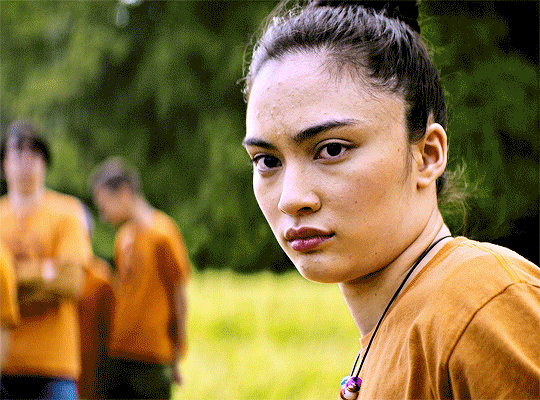
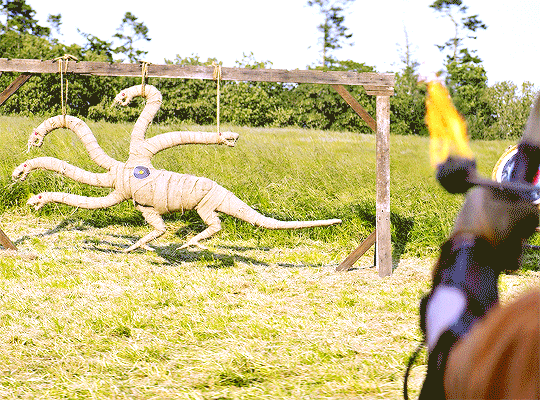
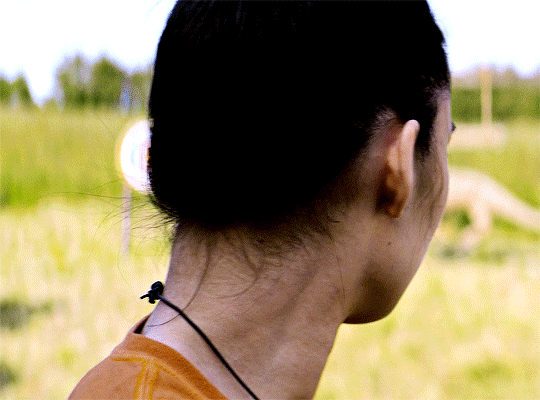
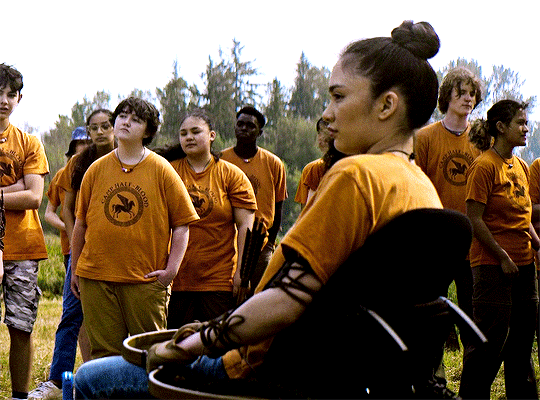

# a beautiful badass disabled demi-god in a wheelchair
#*mine#pjoedit#pjo#pjo spoilers#percy jackson and the olympians#riordanverse#useraurore#tvedit#cinematv#tvarchive#disability#disability representation#this means the world to me#wheelchair
522 notes
·
View notes
Text
They even got the fact that you have to have special wheels to have a chair on non paved ground. Because otherwise it completely messes with the chairs frame.😭
I know it’s one extra in one scene from what I can tell but you almost never get to see all terrain chairs in use. Mostly because people don’t know the difference, hell I didn’t know the difference when I first became a chair user.
447 notes
·
View notes